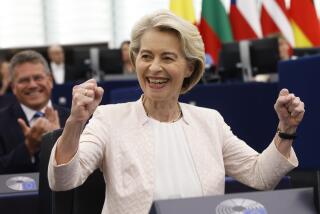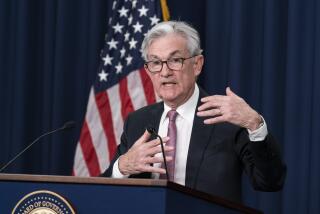European Union Leaders Approve Common Currency
- Share via
BRUSSELS — On one of Europe’s most momentous days since the Berlin Wall was sledgehammered into dust, leaders of the European Union agreed Saturday to launch a single and shared currency in 11 of their countries next Jan. 1, a giant stride toward greater economic and political integration. But they argued bitterly past midnight over who would head the bank that is to manage the new money.
An occasion that should have been a shining date in the half a century of endeavors to build shared peace and prosperity in Europe was soured as the Germans and French--belligerents in two of the 20th century’s most devastating wars, and the nations now at the heart of European cooperation--wrangled over leadership of the new European Central Bank.
Despite this dispute, one of the most acrimonious since the EU was founded, history was unquestionably made at the trade bloc’s modern but drab headquarters in the Belgian capital.
As a result of decisions made Saturday, a new form of money, the euro, is to become the official and shared currency from the tundra of Finland to the heel of the Italian peninsula as of next New Year’s Day. The value of the new money has been pegged at roughly $1.10.
“A page has turned, and a new chapter opens in our history,” Italian Prime Minister Romano Prodi said.
In the gradual introduction of the common European currency, the initial phases will affect mainly bankers, stockbrokers and the international business community.
Then, in 2002, a total of 290 million Europeans--the combined populations of Austria, Belgium, Finland, France, Germany, Italy, Ireland, Luxembourg, the Netherlands, Spain and Portugal--will relinquish their familiar francs, schillings, marks and other national monies and begin using the same euro coins and bank notes.
What wags in the European press have already baptized “Euroland” will conduct 18.6% of international trade, more than the United States, and generate almost a fifth of the world’s wealth, only a fraction less than the U.S. share, according to official EU figures.
For its proponents, the new money will be a megadose of growth hormones for the European economy and will stimulate the ongoing efforts to end nagging 12% unemployment across the European Union.
The euro, some predict, will also become a global heavyweight to challenge the U.S. dollar as the world’s reserve currency of choice.
“It is a historic day because the euro is going to have a huge impact on . . . the future of the people of Europe,” said British Prime Minister Tony Blair, who chaired the Brussels summit though his country is staying out of Euroland for the moment. “It’s going to have an impact on countries in the euro zone, those outside it and the rest of the world.”
However, what should have been a happy photo opportunity with smiles all around wore on until almost 12:30 a.m. today, more than seven hours longer than scheduled, because of what Blair’s spokesman Alistair Campbell called “heavy pounding”--read bitter discord--over who should serve as first president of the European Central Bank.
The Germans, whose powerhouse economy will be the driving force in the new euro zone, had wanted Dutchman Wim Duisenberg, 62, current director of the European Monetary Institute, the forerunner of the ECB.
The new bank will be the keystone of the new currency because, like the U.S. Federal Reserve, it will set interest rates.
A strict monetarist, Duisenberg was regarded by the Germans as ideal for reassuring their jittery public that the euro will be as stable as the tried and trusted German mark.
But French President Jacques Chirac, whose country has the second-biggest economy in the euro zone, has loudly objected to letting a German-backed candidate take the helm of the ECB, which will be located in Frankfurt, the German banking capital.
For this eight-year job, which Campbell called “perhaps the most important unelected post in any European institution,” the French proposed their own alternate candidate, Banque de France Gov. Jean-Claude Trichet, 55.
Though European treaty clauses setting out the mechanisms for economic and monetary union stipulate that the bank’s chairman is to serve an eight-year term, a bit of legerdemain was finally found late Saturday to enable a compromise.
According to Chirac, Duisenberg informed the assembled presidents, prime ministers and ministers that “for personal reasons” he will step down from the job at the bank sometime during the six-month period in 2002 when 12 billion euro bank notes and 76 billion coins are scheduled to replace the national moneys now in circulation.
The deal cut Saturday guarantees that Duisenberg’s successor will be Trichet, Chirac said.
“We feel that given the contribution of France to European construction, [France] can legitimately hope to have the first president of the central bank who serves a full mandate,” Chirac’s spokesman, Jerome Peyrat, said when asked why France had opposed Duisenberg, a candidate approved by all 14 other EU countries.
Appearing at a 12:30 a.m. news conference today, Chirac was buoyant.
“I don’t think it’s sad at all. I’m really quite satisfied,” he answered when asked if it wasn’t regrettable that France had appeared to some to have pursued its own national, rather than European, interests.
The quarrel over the bank’s leadership, which has been simmering for six months, was as nasty as any since former British Prime Minister Margaret Thatcher was battling Brussels in the 1980s over assessments that her country was supposed to pay into EU coffers.
The bank leadership dispute seemed to buttress fears voiced in some quarters that the new European money could become the plaything of politicians--specifically, of politicians in countries such as France, where central bankers traditionally have been servants of their political masters.
Earlier Saturday, the European Union’s parliament voted, 467 to 65, to approve the same 11-nation euro list as the presidents and prime ministers. But not before the head of the largest bloc, the Socialists and their allies, accused the French of trying to put pressure on the European Central Bank
“This is the first test of the euro,” British Labor parliamentarian Pauline Green warned. “We all now know what sort of phone calls the [ECB] president will get in the middle of the night. And we all know where they will come from.”
The advocates of the euro cite a multitude of benefits the currency will have for European business--among them ending currency exchange fees and the dangers from market fluctuations, and welding Europe into more of a single market.
“The European Union needs an effective economic foundation. A common currency will build it,” Finnish President Martti Ahtisaari has said.
Nevertheless, three EU members, Britain, Sweden and Denmark, have decided not to give up their own currencies for the euro, at least not during the single currency’s first wave.
Greece, the 15th EU member, has the trade bloc’s most feeble economy by far, but it hopes to qualify for the euro by 2001.
However, with the notable exception of the Italians, Spaniards and Irish--for whom the euro replaces weak national currencies--the future citizenry of Euroland hardly shares the enthusiasm of political leaders for ceding control over the currency to an untested bank in Frankfurt.
In Germany, some polls have found that 60% of respondents would prefer to keep the mark, the tool and symbol of the nation’s dazzling postwar economic achievements. In France, polls indicate that 47% of the people believe that the new money will bring increases in already high taxes, and 55% believe that it will shred the state-maintained social safety net.
Tourists and other visitors to Europe should notice nothing new at first because after Jan. 1, the 11 national currencies will continue to circulate, albeit legally as expressions of the euro.
Stocks listed on European exchanges and bonds issued by euro member governments, however, will shift into euros. Though euros will not exist in cash until Jan. 1, 2002, credit cards and bank checks may be denominated in euros if the client wishes.
From January to June 2002, all Irish punts, Belgian francs, Dutch guilders and the other national currencies in the euro zone are to be withdrawn and replaced with the new money bearing the euro equivalent of the dollar sign--a Greek epsilon crossed by two parallel lines that are supposed to denote stability.
(BEGIN TEXT OF INFOBOX / INFOGRAPHIC)
Euroland: An Economic Superpower
An 11-nation single-currency zone, which some observers have dubbed “Euroland,” was given the official go-ahead by European Union presidents and prime ministers Saturday. It generates almost as much of the world’s wealth as the United States, and out-trades both the U.S. and Japan.
POPULATION
290 million (combined populations of Austria, Belgium, Finland, France, Germany, Ireland, Italy, Luxembourg, the Netherlands, Portugal, Spain)
****
GROSS DOMESTIC PRODUCT (percentage of world total)
Euroland: 19.4%
United States: 19.6%
Japan: 7.7%
****
TRADE (percentage of world total)
Euroland: 18.6%
United States: 16.6%
Japan: 8.2%
Source: Eurostat, Luxembourg
More to Read
Sign up for Essential California
The most important California stories and recommendations in your inbox every morning.
You may occasionally receive promotional content from the Los Angeles Times.










